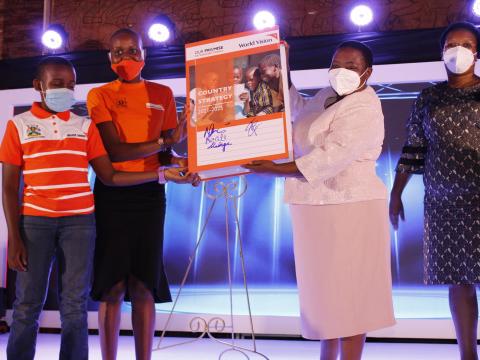Launched: World Vision's Uganda Country Strategy (2021-2025)

World Vision has launched a new five-year strategy for its Ugandan operations, which seeks to contribute to the improved and sustained well-being of more than 5.2 million vulnerable children across the country.
The strategy titled "Partnership and Collaboration for Greater Impact" prioritises food security and livelihoods, water, sanitation and hygiene (WASH), education, health and nutrition programmes to impact children and their communities. The new roadmap will integrate child protection throughout its implementation.
Inspired by the 35-year journey of transforming the lives of vulnerable children and their families, World Vision will achieve this through leveraging its global networks, local partnerships and expertise to fundraise over the five years —2021-2025.

Officiating at the launch that was streamed live via various digital platforms, the Prime Minister of Uganda, Robinah Nabbanja pledged to track World Vision’s programmes to ensure they are implemented and not just end on paper. She urged the organisation to be driven by field experience.
“It’s my prayer that this strategy helps you remain the organisation we all know and associate with; an organisation that responds to the cries of every child and collaborates and works with all. Beyond the strategy launch, I will be interested in hearing and tracking the progress of its implementation so that it does not remain on paper. You have my full support and that of the Government”, Nabbanja said.
Jason Evans, Country Director for World Vision in Uganda led the leadership team and staff at the launch in Kampala. He underlined that children were at the centre of the new strategy. “It is our promise to vulnerable children and part of our efforts to focus our resources to have the most significant impact on children. At the same time, it reflects our renewed commitment to vulnerable children", Jason said.
World Vision new strategy for Uganda is guided by the organisation's global strategy and well-aligned to national and international development goals.
"It is premised on our ability to learn and adapt as an organisation continuously", Jason further added. "We will bring lessons we have learnt previously, reflect on what did not go well or what we could have done better, and continue adapting our work so that we are more agile, including in the face of the COVID-19 pandemic and our response to it."

Through this strategy, the organisation will build on its strengths and expertise in fragile contexts, food security and livelihoods, health and nutrition, education, WASH, and child protection, tapping into its solid partnerships and innovations to enhance its impact on children. The strategy's targeted reach and priority areas were carefully identified and chosen through a national vulnerability census mapping.
The new strategy is a product of collaborative efforts between World Vision and its key stakeholders, including children, communities, government, faith leaders, civil society organisations and private sector players.
Susan Lubega, Board Chair for World Vision in Uganda appreciated the support and partnership for providing insights into issues that affect children and ways to solve them. "We are thankful for all our partners who have supported World Vision on this journey to advocate for children's needs, to amplify their voices and opportunities, and to increase support for children toward their greater well-being", she said. "We remain optimistic about the promising possibilities for children, and we look forward to working together, tapping into our strong partnerships, as well innovating, to deliver on our promise for children's well-being."

Since 1986, World Vision has been at the forefront of supporting and advocating for the well-being of children through a diverse range of relief, development and advocacy programmes in Uganda.
In the last five years, working with communities, donors, government and partners, World Vision reached more than 5 million children through a diverse range of relief, development and advocacy programmes across the country.